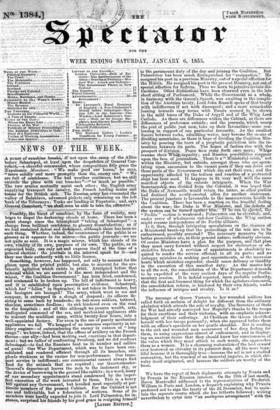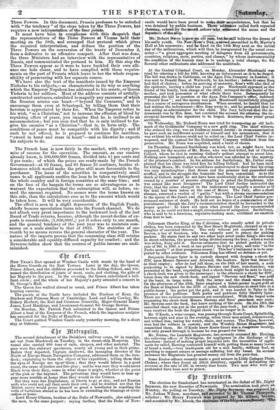We have the report of fresh diplomatic attempts by Russia
and by Prussia in the Russian interest. On the 19th of last month, Baron Manteuffel addressed to the representatives of Frederick William in Paris and London, a despatch explaining why Prussia preferred not to sign the treaty of the 2d December, but to main- tain the separate course which she has hitherto followed ; willing nevertheleea to enter into "an analogous arrangement" with the Three Powers. In this document, Prussia professes to be satisfied with "the tendency" of the steps taken by the Three Powers, hut requires a new interpretation of-the four points.
It must have been in compliance with this despatch that the representatives of the Three Powers at Vienna held their meeting on the 28th, and arranged that protocol which gives the required interpretation, and defines the position of the Three Powers on the conversion of the treaty of December 2, from a defensive to an offensive compact. After that was done, the three Ministers had an interview with the representative of Russia, and communicated the protocol to him. By this step the Three Powers appear as it were to have buckled their own all- ante one hole closer, and to have complied with those require- -ments on the part of Prussia which leave to her the whole respon- sibility of persevering with her separate course. We have also the text of the manifesto issued by the Emperor Nicholas to his subjects,—as characteristic in its way as anything which the Emperor Napoleon has addressed to his senate, or Queen Victoria to her soldiers. Most of the address consists of artfully- constructed sentences, calculated to magnify any successes of which the Russian armies can boast—" beyond the Caucasus," and to encourage them even at Sebastopol, by telling them that their heroism is appreciated by their foe. When the Emperor refers to his wish, "as a Christian," not to increase the effusion of blood by repulsing offers of peace, you imagine -that he is inclined to an accommodation ; but you soon find 'thathe is only inclined to for- give his enemies " as a Christian"—that is, in form only. The conditions of peace must be compatible with his dignity ; and if such be not offered, he is prepared to continue his sacrifices, -"sword in hand and cross in heart"—and so likewise he expects his subjects to do.







































 Previous page
Previous page